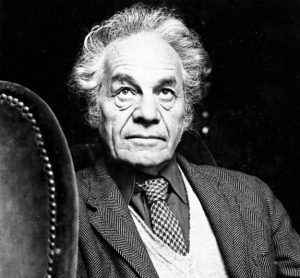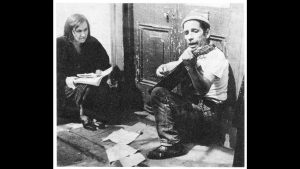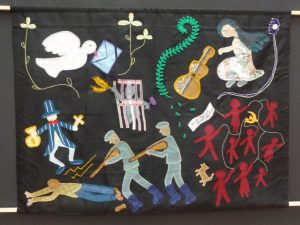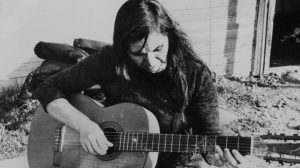By Donato Cabrera│medium.com/@donatocabrera
September 20, 20204
The Chilean folklorist, visual artist, composer and singer-songwriter, Violeta Parra was born in October 1917. Parra helped establish a Chilean musical identity through her tireless championing of the folk songs she collected throughout the country. This movement, known as the Nueva Canción Chilena (The Chilean New Song), would eventually reach throughout the continent and for this Parra is justifiably called the “Mother of Latin American folk.”

One of nine children, the entire Parra family is an artistic and cultural force. Winner of the Cervantes Prize in 2011 Violeta’s brother, Nicanor (1914–2018), is considered alongside Pablo Neruda as one of the most important poets in the Spanish language. His collection Poemas y Antipoemas from 1954 isone of the most influential Spanish poetry collections of the twentieth century. Here is one of my favorite poems of Nicanor Parra.
ÚLTIMO BRINDIS
Lo queramos o no
Sólo tenemos tres alternativas:
El ayer, el presente y el mañana.Y ni siquiera tres
Porque como dice el filósofo
El ayer es ayer
Nos pertenece sólo en el recuerdo:
A la rosa que ya se deshojó
No se le puede sacar otro pétalo.Las cartas por jugar
Son solamente dos:
El presente y el día de mañana.Y ni siquiera dos
Porque es un hecho bien establecido
Que el presente no existe
Sino en la medida en que se hace pasado
Y ya pasó…,
como la juventud.En resumidas cuentas
Sólo nos va quedando el mañana:
Yo levanto mi copa
Por ese día que no llega nunca
Pero que es lo único
De lo que realmente disponemos.
Whether we like it or not,
We have only three choices:
Yesterday, today and tomorrow.
And not even three
Because as the philosopher says
Yesterday is yesterday
It belongs to us only in memory:
From the rose already plucked
No more petals can be drawn.
The cards to play
Are only two:
The present and the future.
And there aren’t even two
Because it’s a known fact
The present doesn’t exist
Except as it edges past
And is consumed…,
like youth.
In the end
We are only left with tomorrow.
I raise my glass
To the day that never arrives.
But that is all
we have at our disposal. (https://www.poemhunter.com/poem/the-last-toast/)

Violeta’s other brother, Roberto (1921–1995), was also an important folklorist and singer-songwriter. Here is a great album of his cuecas.
And Violeta’s children Ángel and Isabel continue the Parra legacy and also important musicians in their own right.
But it is the music of Violeta Parra that I’m sharing today. In the early fifties, Parra began to collect authentic Chilean folk music from all over the country. Parra’s first recordings date from 1952 for EMI Odeon and immediately became quite popular. Here is Que Pena Siente el Alma from these first recordings.
While performing and living in Europe, Parra would record a set of songs for the French label, Le Chant du Monde, in 1956.
Returning to Chile in 1957, Parra began to record a series of LPs called The Folklore of Chile.
Parra was also a gifted visual artist and created Arpilleras, a patchwork of cloth, stitch, and paint, and in 1964 became the first Latin American artist to have a solo exhibition at the Louvre.

In the sixties, Parra began recording her own songs and Gracias a la Vida, a song she wrote in 1966, became popular throughout Latin America, initially through a recording made by Mercedes Sosa in 1971.
And in 1974 by Joan Baez recorded the song further widening the song’s popularity.
And in Brazil in 1976 by Elis Regina.
It remains one of the most covered Latin American songs of all time. Here is the original recording that Parra made in 1966.
Parra’s last song that she wrote, Volver a los Diecisiete (Being Seventeen Again), is truly a masterpiece in every way.
Volver a los diecisiete
después de vivir un siglo
es como descifrar signos
sin ser sabio competente.
Volver a ser de repente
tan frágil como un segundo,
volver a sentir profundo
como un niño frente a Dios,
eso es lo que siento yo
en este instante fecundo.Se va enredando, enredando,
como en el muro la hiedra,
y va brotando, brotando,
como el musguito en la piedra,
ay, sí sí sí.Mi paso retrocedido,
cuando el de ustedes avanza;
el arco de las alianzas
ha penetrado en mi nido
con todo su colorido,
se ha paseado por mis venas
y hasta las duras cadenas
con que nos ata el destino
es como un diamante fino
que alumbra mi alma serena.Lo que puede el sentimiento
no lo ha podido el saber,
ni el más claro proceder
ni el más ancho pensamiento.
Todo lo cambia el momento
cual mago condescendiente,
nos aleja dulcemente
de rencores y violencia:
solo el amor con su ciencia
nos vuelve tan inocentes.El amor es torbellino
de pureza original;
hasta el feroz animal
susurra su dulce trino,
detiene a los peregrinos,
libera a los prisioneros;
el amor con sus esmeros
al viejo lo vuelve niño
y al malo solo el cariño
lo vuelve puro y sincero.De par en par la ventana
se abrió como por encanto,
entró el amor con su manto
como una tibia mañana;
al son de su bella diana
hizo brotar el jazmín,
volando cual serafín,
al cielo le puso aretes
y mis años en diecisiete
los convirtió el querubín.
Returning to seventeen
After a century of living
Is like deciphering signs
without wisdom or competence,
to be all of a sudden
as fragile as a second,
to find a deep feeling
like a child in front of God,
that is what I feel
in this fecund instant.
Entangling, entangling it moves,
like the ivy on the wall,
and so it flowers, and it grows,
like tiny moss on the stone.
Oh yes oh yes
My steps is backward
while yours keep advancing,
the arch of alliances
has penetrated my nest,
with all of its wide palette
it has walked through my veins
and even the hard chains
with which destiny chains us
is like a fine diamond
that lightens my serene soul.
What feelings can grasp
knowledge cannot understand,
not even the clearest move
not even the widest thought,
the moment changes everything
the condescending magician,
separates us sweetly
from rancor and violence,
only love with its science
makes us innocent.
Love is a whirlwind
of original purity,
even the fierce animal
whispers its sweet trill,
stops the pilgrims,
and liberates the prisoners,
love with its best efforts
turns the old into a child
and only affection
can turn the bad pure and sincere.
The fully open window
opened by pure enchantment
love entered with its blanket
like a lukewarm morning,
the melody of its beautiful Diana
prompted the flowering of jasmine,
flying like a seraphim
placed earrings in the sky
and my years in seventeen
cherub did convert.
https://lyricstranslate.com
A wonderful Chilean biopic, Violeta Went To Heaven was released in 2011 and is definitely worth seeing. It won Sundance’s 2012 World Cinema Dramatic Jury Prize.
In 1967, Violeta Parra took her own life.

